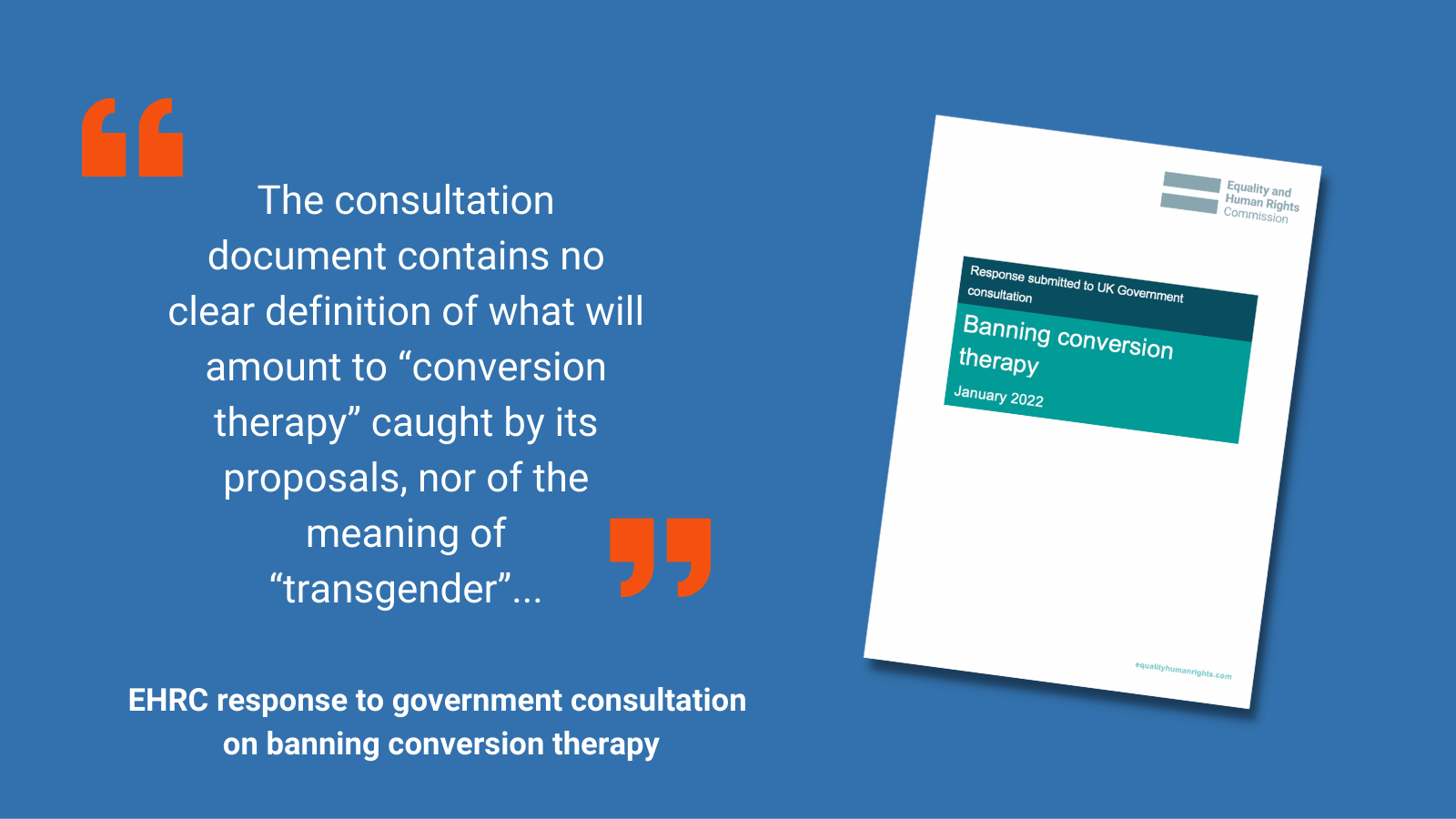The EHRC steps up
Sex Matters welcomes its statements on Gender Recognition Act reform and conversion therapy.

The Equality and Human Rights Commission has today released two important documents that signal another turning point in the debate on sex and gender identity in the UK. The first is a letter from EHRC Chair Kishwer Falkner commenting on the Scottish Government’s plan to reform the Gender Recognition Act 2004 towards self-identification. The second is the EHRC’s response to the government’s consultation on its plan to ban conversion therapy.
Both documents are clear in differentiating sex, sexual orientation and gender reassignment as separate protected characteristics, and protecting everyone’s human rights.
Sex Matters welcomes the EHRC’s intervention:
“The EHRC shows how the UK can lead the way in ensuring clear protection for the human rights of all. The equality watchdog’s measured approach is embedded in material reality, recognises the risk of unintended consequences, and emphasises the need for clear definitions, evidence and respect for human rights. We hope that the governments in Westminster and Holyrood will listen to this advice.”
Maya Forstater, Executive Director, Sex Matters
Gender recognition reform: consider potential consequences
Kishwer Falkner tells the Scottish Government that the EHRC wants to work with them and with other interested parties to “support a careful and respectful discussion of potential changes to the law”.
She highlights concerns about the implications of changing the criteria for obtaining a Gender Recognition Certificate:
“These concerns centre on the potential consequences for individuals and society of extending the ability to change legal sex from a small defined group, who have demonstrated their commitment and ability to live in their acquired gender, to a wider group who identify as the opposite gender at a given point. The potential consequences include those relating to the collection and use of data, participation and drug testing in competitive sport, measures to address barriers facing women, and practices within the criminal justice system, inter alia.”
She states that the EHRC considers that:
“the established legal concept of sex, together with the existing protections from gender reassignment discrimination for trans people and the ability for them to obtain legal recognition of their gender, collectively provide the correct balanced legal framework that protects everyone. This includes protecting trans people from discrimination and harassment, and safeguarding their human rights.”
Conversion therapy: caution, evidence and pre-legislative scrutiny
In its response to the government consultation, the EHRC says that it is supportive of measures to end harmful conversion therapy practices, but emphasises that the significant and wide-ranging implications of the Government’s proposals – for criminal and civil justice, clinicians and therapists, families and religious organisations – require careful and detailed consideration.
No clear definitions
The EHRC shares our concern that the original consultation period was limited to six weeks rather than the usual 12 weeks and welcomes its extension. It notes that a more robust consultation would have been achieved had the consultation document contained clear definitions of “conversion therapy” and of “transgender” – a term which it says “has no clear legal meaning, is potentially wider than the concept of gender reassignment in current UK law, and is understood by different people in different ways”.
Lack of evidence
The EHRC has clearly read the Coventry University study and noted that it contains no evidence on conversion therapy in relation to being transgender. Like us, it calls for the government to wait for the Cass Review:
“Given the documented lack of evidence about conversion therapy in relation to being transgender, recent attention and litigation on the implications of medical and surgical transition, and the ongoing NHS-commissioned independent review of gender identity services for children and young people led by Dr Hilary Cass OBE, we consider that these matters require further careful and detailed consideration before legislative proposals are finalised and the implications of them can be fully understood.”
Address sexual orientation and being transgender separately
The EHRC argues that given the lack of evidence about conversion therapy in relation to being transgender and the importance of any ban not preventing appropriate support for individuals with gender dysphoria, the legislation should initially focus on banning conversion therapy related to sexual orientation.
“Legislation to ban conversion therapy attempting to change a person to or from being transgender should follow, once more detailed and evidence-based proposals are available which can be properly scrutinised.”
Pre-legislative scrutiny
The EHRC says that should the Government decide to proceed with its proposals for legislation to ban both types of conversion therapy, a draft bill should be published for pre-legislative scrutiny by a committee of both Houses of Parliament.
This approach will ensure that legislation to ban harmful conversion therapy practices contains clear definitions and terminology so that its effects can be properly understood; and is evidence-based and proportionate.
It also recommends that the Government produces a Human Rights Memorandum to accompany the legislation so that the implications for the protection of human rights can be properly considered by Parliament.
